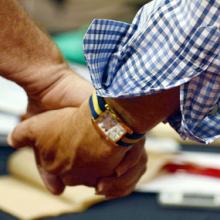denominationalism
The quaint Pillar Church sits directly across the street from Hope College in Holland, Mich. — the first congregation established by a wave of Dutch immigrants to the area. When I enrolled at Hope in 1963, all I knew was that virtually no students went to Pillar Church.
A half century later, the story of Pillar Church tells a much larger narrative of the long and arduous journey toward authentic Christian unity.
Pillar Church and Hope College were both founded as part of the Reformed Church in America, a denomination formed by Dutch settlers to New Amsterdam (we now call it New York City) in 1628. A later wave of Dutch immigrants settled in the Midwest, particularly western Michigan. Some of them broke away and established the Christian Reformed Church in North America in 1857.
From its founding, Pillar Church had been a member of the RCA. But in 1882, a group siding with the emerging CRC seized the church building, locked its doors with chains, and, grasping axe handles, defended it against their fellow congregants. From then on, Pillar Church was a CRC congregation, and it became essentially foreign territory to those of us at the RCA-affiliated school across the street.
One would think that sharply defined theological differences among Reformed Protestants — who are famous for their theological exactitude — would have been the cause of such a dramatic intra-ethnic split. But no.
We live in a church context where so many embrace unbiblical either/or understandings of Christianity: Either evangelism or social action, either inward journey or outward journey. And on and on.
It is the widespread onesidedness that makes Rich Nathan’s new book so exciting.

